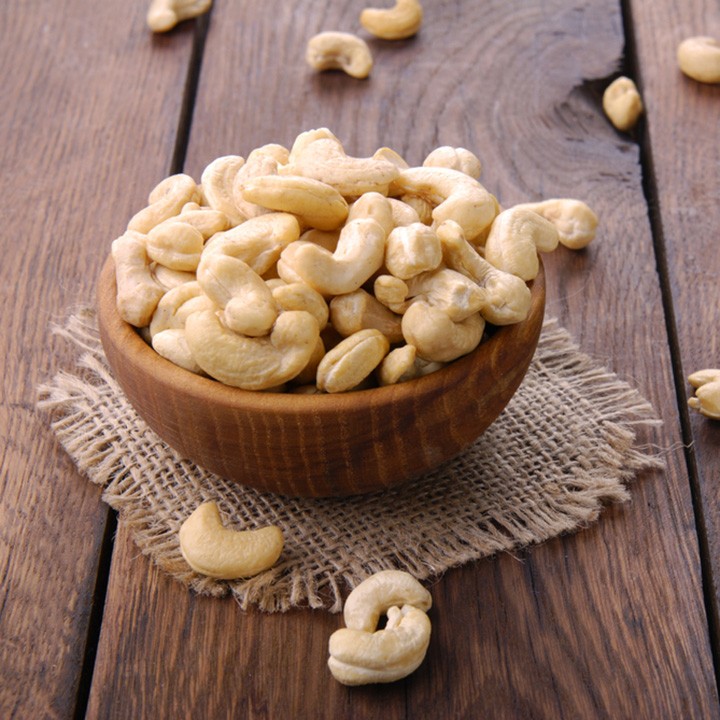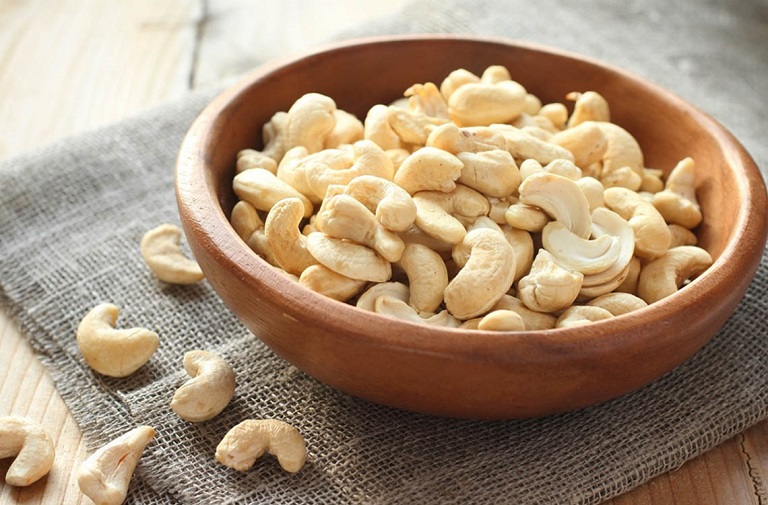1. What do you know about Cashew?

- Cashews are a kidney-shaped nut that comes from the cashew tree – a tropical tree native to Brazil but now grown in many different warm climates around the world.
- Although often referred to as tree nuts, and nutritionally comparable to them, cashews are actually nuts. They are rich in nutrients and beneficial plant compounds, making them easy to add to many dishes.
- Like most nuts, cashews can also help improve your overall health. They have been linked to benefits like weight loss, improved blood sugar control, and a healthier heart.
2. Nutritional ingredients in Cashew Nuts
Cashews are rich in nutrients. 28 g of unroasted, unsalted cashews provided
- Calories: 157
- Protein: 5 g
- Fat: 12 g
- Carbs: 9 g
- Fiber: 1 g
- Copper: 67% Daily values (DV)
- Magnesium: 20% DV
- Manganese: 20% DV
- Zinc: 15% DV
- Phosphorus: 13% DV
- Iron: 11% DV
- Selenium: 10% DV
- Thiamine: 10% DV
- Vitamin K: 8% DV
- Vitamin B6: 7% DV
Cashews are especially rich in unsaturated fats. This is a type of fat that has been linked to a reduced risk of early death and heart disease. Cashews also contain less sugar.
In addition, cashews also contain a significant amount of copper. An essential mineral for energy production, healthy brain development and a strong immune system. They are also an excellent source of magnesium and manganese, nutrients important for bone health
3. Benefits of Cashew Nuts

3.1. Help lose weight
- Nuts are very high in calories and fat. Therefore, people who want to lose weight are often advised to limit the amount of nuts in their diet.
- However, research is beginning to link nut-rich diets to greater weight loss and lower total body weight than nut-free diets.
- This can partly be explained by the fact that cashews seem to provide the body with fewer calories than previously thought.
- The weight loss benefits may be strongest for raw, whole cashews. Although more research is still needed to confirm this. And you may be sacrificing the antioxidant benefits of roasting cashews.
- In addition to providing fewer calories than expected, nuts are also rich in protein and fiber, known to reduce hunger and promote satiety, both of which can promote weight loss.
3.2. Improve heart health
- A diet rich in nuts, including cashews. Associated with a reduced risk of diseases, such as stroke and heart disease
- Several studies have focused on the specific heart health benefits of cashews.
- One result showed that people with type 2 diabetes who consumed 10% of their daily calories from cashews had a lower ratio of LDL (bad) to HDL (good) cholesterol than those who didn’t eat cashews.
- A low LDL/HDL ratio is often considered a sign of good heart health
- Two other studies link cashew consumption to higher levels of HDL cholesterol and lower blood pressure, as well as lower levels of total and LDL cholesterol.
- However, a recent review found conflicting results. One of the studies showed that eating cashews regularly can lower blood pressure and triglyceride levels. However, it does not affect total, LDL or HDL cholesterol levels
3.3. May be beneficial for people with type 2 diabetes
- People with type 2 diabetes can benefit from adding cashews to their diet.
- That’s partly because cashews are a good source of fiber. This is a nutrient that helps prevent blood sugar spikes.
- Studies looking at the effects of cashews on blood sugar are limited.
- However, in one study, people with type 2 diabetes who ate 10% of their daily calories from cashews had lower overall insulin levels. This result is obtained when compared to those who do not eat cashews
- Furthermore, cashews contain only 8 grams of net carbs per serving, of which less than 2 g comes from sugar.
- Net carbs are the total amount of carbs in a food, minus the amount of fiber it contains – providing a value for how many net carbs your body can actually absorb.
- Replacing starchy and sugary foods with cashews can help lower blood sugar
That said, more research is needed to look at the effects of a cashew-rich diet in people with type 2 diabetes.
4. Dishes made from Cashew Nuts
- Cashews are easy to add to the diet.
- They can be eaten raw or roasted, and are a light and easy-to-carry snack.
- Whole or ground cashews can also be incorporated into a variety of dishes. From tofu and stir-fries, to soups, salads and stews.
- Cashew butter is another way to add cashews to the diet. Spread it on toast or stir with yogurt or oatmeal. You can also make cashew butter with your favorite oats and dried fruit and use
- Cashews can also be soaked and mixed with apple cider vinegar or lemon juice to make dairy-free sour cream or cream cheese.
- Just be aware that some roasted and salted cashews can contain significant amounts of oil and salt. If the goal is to limit excess salt or added fat. Consider choosing dry roasted or unsalted raw cashews whenever possible
5. Points to note when using
- Cashews are generally a safe addition to most people’s diet.
- Keep in mind that roasted or salted cashews can contain a lot of added oil or salt. For this reason, it is best to choose dry roasted or raw unsalted varieties instead.
- Some studies suggest that roasted cashews may contain higher levels of health-promoting antioxidants than raw cashews. Consider roasting your own raw cashews at home without adding any oil
- To do so, simply spread the raw cashews in a single layer on a baking tray. Then bake them at 188°C on the middle rack of the oven for 8–15 minutes. Remember to stir the cashews for a period of 3-5 minutes to avoid burning.
- Alternatively, toast the cashews in a pan over medium heat for 3-5 minutes or until the cashews are slightly browned.
- Furthermore, cashews contain phytates that can make it difficult for the body to absorb the vitamins and minerals found in cashews. Soaking nuts overnight before adding them to dishes will help reduce their phytate content and improve their digestibility.
6. Conclude
- Cashews are rich in fiber, protein, and healthy fats. They also contain a variety of vitamins, minerals, and health-promoting plant compounds.
- Similar to nuts, cashews may promote weight loss, blood sugar control, and heart health. However, there is less research on cashews than other nuts. Therefore, more specific studies on cashews are needed to confirm these benefits.
- That said, there is little upside to adding more cashews to your diet. Just remember to choose dry-roasted or raw unsalted varieties whenever possible.

